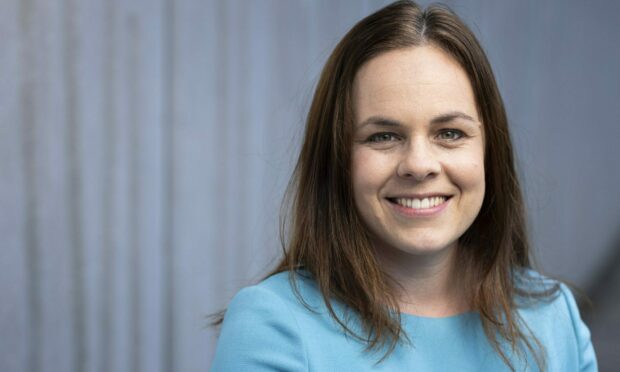Former Finance Secretary Kate Forbes bravely chose to speak up about her battle with postnatal depression to the Press and Journal.
It was unusual for a politician to speak with such candour about a topic that might still be off limits for many.
But within minutes of appearing in the P&J on Wednesday, the ex-SNP leadership candidate was flooded with praise for opening up her private life to help others.
Other mums started to share their stories online – and with Ms Forbes – and charities said they were being inundated with media interest.
‘Incredibly powerful’
Gill Skene, chair of Latnem, a charity offering maternal mental health support in the north-east, said Ms Forbes sharing her own story is “incredibly powerful”.
The charity has over 200 active members and offers face to face support in Aberdeen, Inverurie and Elgin, but also helps women remotely across Scotland.
Ms Skene, who had a traumatic birth with her eldest, leaving her with PTSD and anxiety, said the MSP has an “opportunity to really make change in a position of power”.
She added: “In more remote and rural communities there can be a big stigma.”
The charity chair would like to see a mother and baby unit set up in the north of the country to support women with the most severe mental ill health.
And the organisation is currently working to extend the period women can access NHS support for perimental health issues from one year to two – in line with England.
‘I’m moved by the real stories’
In our exclusive interview, the MSP for Skye, Lochaber and Badenoch said she was left feeling an “intense sadness I would never escape from”.
And she also shared the “terrors” and fears that someone would harm her baby.
Taking to social media on Thursday, Ms Forbes added she is keen to “pursue these matters further” for mums in Scotland and across the world.
My purpose was to raise awareness of this common but overwhelming, debilitating condition that affects many mums in various forms. I was ignorant of it until it hit me. I didn't believe it would ever end. It did – and it can for you too, with the right care. There’s hope! /2
— Kate Forbes MSP (@_KateForbes) September 21, 2023
Laura Seebohm, CEO of the Maternal Mental Health Alliance, a UK-wide charity, said new and expectant mums in need of support “will come forward thanks to Kate’s candour”.
“When high-profile individuals like Kate Forbes share their experience of postnatal depression without shame, they not only diminish the stigma that we know surrounds perinatal mental illness but also light the path for countless women to seek the help they deserve”, she added.
READ: Kate Forbes shares terror of ‘totally destabilising’ postnatal depression
‘We applaud the courage’
Dr Doug Hutchison, consultant clinical psychologist in NHS Highland’s perinatal and infant mental health team, said he was “very encouraged” to read the P&J interview.
He said: “We are grateful that she was willing to draw upon her own experiences of pregnancy, childbirth and motherhood, in order to highlight the mental health challenges faced by many parents and families at these times.
“We applaud the courage she has shown by publicly reflecting on a set of very difficult experiences, in order to reduce the sense of stigma for others in a similar position.
“We are also grateful for her affirmation of the role of the NHS in providing care for her and her family when they needed it.”
First Minister Humza Yousaf was among those publicly supporting his former leadership challenger as “exceptionally powerful and brave”.
He added: “I am sure it will give many women courage, and hopefully comfort knowing they are not alone in dealing with postnatal depression.”
Symptoms of postnatal depression and how to access support:
Postnatal depression is a type of depression that many parents experience after having a baby. It affects more than one in 10 women within a year of giving birth. It can also affect fathers and partners.
Signs can include:
- a persistent feeling of sadness and low mood.
- lack of enjoyment and loss of interest in the wider world.
- lack of energy and feeling tired all the time.
- trouble sleeping at night and feeling sleepy during the day.
- finding it difficult to look after yourself and your baby.
- withdrawing from contact with other people.
If you think you may be depressed, speak to a GP, midwife or health visitor as soon as possible.
Latnem is a north-east based maternal mental health charity which offers peer support to women across Scotland. They can be contacted, here.
There are also more specialist services to support those at risk of becoming more unwell. These include:
- perinatal mental health services.
- hospitals, and mother and baby units (MBUs).
Read more via the NHS Inform website here.



